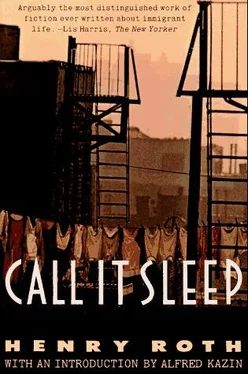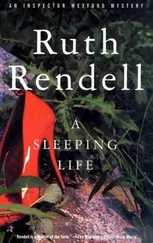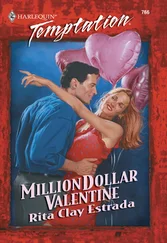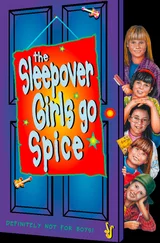“No.” He freed himself. “You haven’t got any skates, have you Aunt Bertha?”
“Skates? What would I do with skates, child? And in this little dungheap? I can’t sell five-cent pistols or even horns with the red, white and blue, so how could I sell skates? Wouldn’t you rather have ice-cream? It is very good and cold.”
“No.”
“A little halvah? Crackers? Come, sit down awhile.”
“No, I’m going home.”
“But you just came.”
“I have to go.”
“Ach!” she cried impatiently. “Let me look at you awhile — No? Take this penny then,” she reached into her apron. “Buy what I haven’t got.”
“Thanks, Aunt Bertha.”
“Come see me again and you’ll have another. Sweet child!” She kissed him. “Greet your mother for me!”
“Yes.”
“Keep hale!”
X
SPIT someone?
He glanced up and backward overhead. To the north and south the cogged spindle of the sky was an even stone-grey.
— Dope! Ain’t spit. Hurry up!
Umbrellas appeared. The black shopping bags of hurrying housewives took on a dew-sprent glaze. Inside their box-like newstands, obscure dealers tilted up shelves above the papers. As the drizzle thickened the dull façades of houses grew even drabber, the contents of misty shop-windows indeterminate. A dense, soggy dreariness absorbed all things, drained all colors to darkness, melted singleness, muddied division — only the tracks of the horse-cars still glinted in the black gutter as whitely as before. He felt disgusted with himself.
— Wet on my shirt, hair, gee! Two blocks yet. Giddap!
Rain had coated sidewalk and gutter with a slimy film. On flattened tread, he jogged cautiously homeward, ducking under awnings when he could, skirting the jutting stoops. Not too drenched, he reached his corner.
“Run! Run! Sugar baby! Run! Run! Sugar baby!” Sheltered from the downpour, children in the dry covert of hallways relayed the cry — a mocking gauntlet for those who hurried in the rain. There were several such bantams snugly crowing in his own doorway. One or two of the faces belonged to those who had sat on the curb while Kushy had told about the canary. Resentfully, he fixed his eyes before him and ran up the iron stairs of the stoop. He wasn’t going to talk to them at all. But as he was about to enter the hallway one of them stepped in his path—
“Hey, you’re Davy aintcha?”
“Yea.” He looked up sullenly. “Waddayuh wan’?”
“Dey’s a kid lookin’ fuh yuh.”
“Yea,” another chimed in. “W’it’ skates he had.”
“Fuh me? A kid w’it’ skates?” His heart bounded with incredulous joy. Sudden warmth gushed through every vein. “Fuh me?”
“Yea.”
“Leo? Did he say he wuz Leo?”
“Leo, yea; futt flaw, sebm futty fi’. He’s a goy.”
“So wad he wan’?” eagerly.
“He says comm op righd away.”
“Me?”
“Yea, he wuz jost lookin’—”
But David had already leaped down the stairs and was sprinting through the rain toward Leo’s house. Up the stoop he went, proudly, as though Leo’s call had saturated the fabric of his spirit with a tingling, toughening glow, as though his being were pursed into a new shape of assurance. Here also children crowded the hallway, but he brushed by them without a word or a moment’s hesitation. He was Leo’s friend! And he climbed the obscure stairs without a wisp of fear. At the top floor, he stopped, looked about — all the shadowy doors were closed.
“Hey Leo!” he sang out, and the boldness of his own voice surprised him. “Hey Leo, w’ea d’yuh live?”
He heard an answering voice and almost immediately after, a door splayed out a fan of light.
“C’mon in.” Leo stepped out.
“Leo!” David would have hugged him if he dared. “Yuh called me?”
“Yea, it begun to rain, so I come back. Didn’ wanna get me skates all rusty.”
“Gee, I’m glad I comm home!” David followed him into the kitchen.
“I wuz just wipin’ ’em.” Leo sat down on a chair, picked up an oily rag at his feet and began vigorously polishing the various parts.
“Yuh all alone.” He found a seat against the wall.
“Sure.”
“Hoddy yuh ged in yuh house?”
“W’it’ a key, hodja t’ink?”
“Gee!” admiringly. “Yuh god a key of yuh own ’n’ ev’y t’ing?”
“‘Course. See dat shine?” He lifted the gleaming skate.
“Gee, you know how.”
“Yuh do dis ev’y day, dey never get rusty on ye.”
“No. But look w’ad I brung ye, Leo.” Heart leaping with delight he held out the two candies.
“Gee!” Leo hopped up with alacrity. “W’ot kind?”
“A emmend an’ pineapple.”
“Oh, boy! Bot’ of ’em fuh me?”
“Yea.” He found himself regretting he had not accepted the other tid-bits his aunt had offered him.
“Yer a nice guy!” Leo set the chocolates on the table. “W’edja git ’em?”
“Aintcha gonna ead ’em?” He asked eagerly.
“Naw, I’m savin’ ’em fuh later. I wanna eat sumpt’n else foist.”
“Oh! My a’nt ga’ me ’em — Gee! I fuhgod tuh tell yuh. She owns a kendy staw.”
“No kiddin’! W’ea does she live?”
“Wey down in Kane Stritt. But you c’n go easy — yuh god skates.”
“Sure let’s go dere sometimes — maybe we c’n cop a whole box of jelly beans. D’ja get any gum drops?”
“No,” self-reproachfully. “I coulda — Gee!”
“Dey’re good.” Leo had put down the skates and gone over to the bread box on a shelf beside the sink. “Me fuh sumpt’n t’ eat.” He drew out a loaf of bread. “Want some?”
“I ain’ so hungry.” He felt suddenly shy. “Id’s oily yed.”
“Wot of it?” He began undoing the printed waxed-paper about the bread. “I eats w’en I wants tuh.”
“Awri’.” Leo’s independence was contagious.
“Got sumpt’n good too,” he promised, going over to the ice-box. “Sumpt’n we don’ have ev’y day.”
While Leo ferreted among the dishes, David stole blissful glances about him. It gave him a snug, adventurous feeling to be alone in a whole house with someone so resourceful as Leo. There were no parents to interfere, no orders to obey — nothing. Only they two, living in a separate world of their own. Nor were goyish kitchens so different from Jewish ones. Like his own, this too was a cubical room with stove, sink and washtubs flush against the walls. And the walls were green, and the white curtains, hanging from taut strings across the window-frames, sere with too much washing, and the flowered linoleum, scuffed like his own. Both were equally scrubbed and tidy, but where David’s kitchen had a warm tang to its cleanliness, Leo’s had a chill, flat odor of soap. That was all the difference between them, except perhaps for a certain picture in the shadowy corner at the further end of the room — a picture that for all of David’s staring would not take on a reasonable shape because the light was too dim.
“Is she got a reggiler big canny staw?” Kneeling before the ice-box, Leo had been buttering bread. And now he pushed several objects from a large platter onto a small one. “Ice-cream poller too?” He arose.
“My aunt? Naa. She god just a—” He broke off, gaped at what Leo had placed on the table. In one of the plates was a stack of buttered bread, but on the other, a heap of strange pink creatures, all legs, claws, bodies—“Wod’s dat?”
“Dese?” Leo snickered at his surprise. “Don’tcha know wat dis is? Dem’s crabs.”
“Cre—? Oh, crebs! Dey wuz green-like, w’en I seen ’em in a box on Second Evenyeh—”
“Yea, but dey a’ways gits red w’en ye berl ’em. Dey’re real good! Gonna eat some?”
Читать дальше












